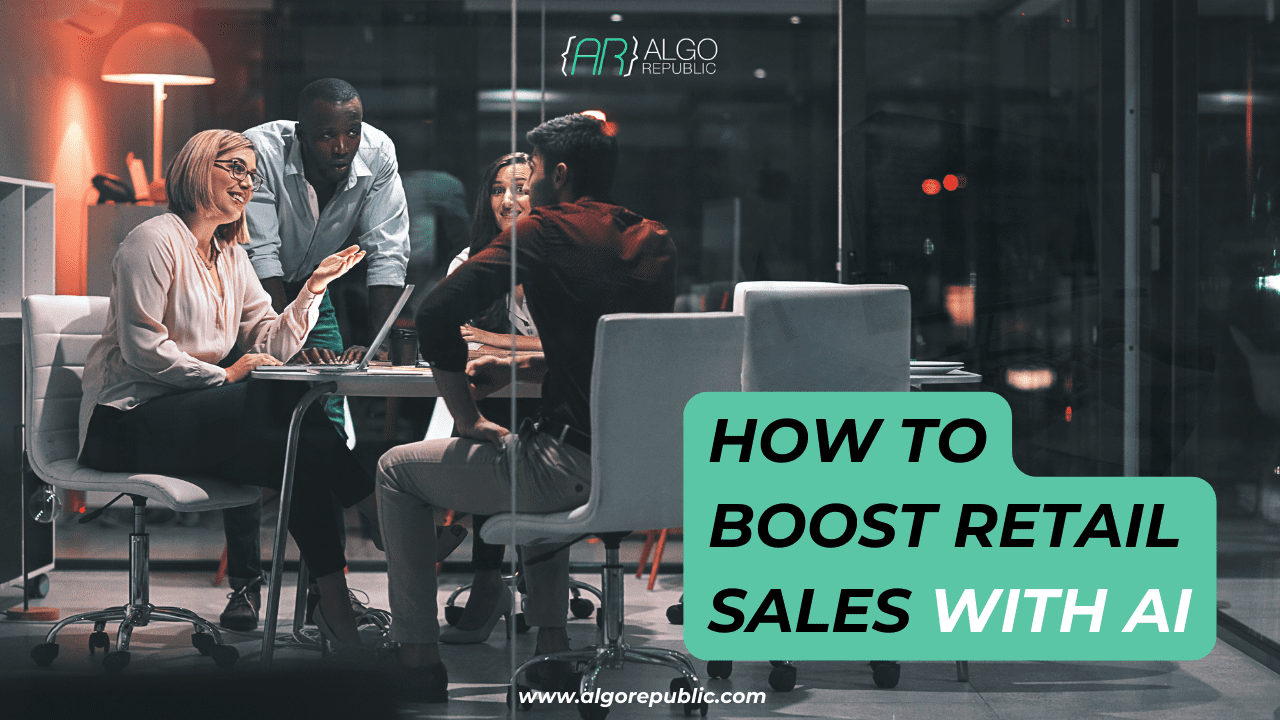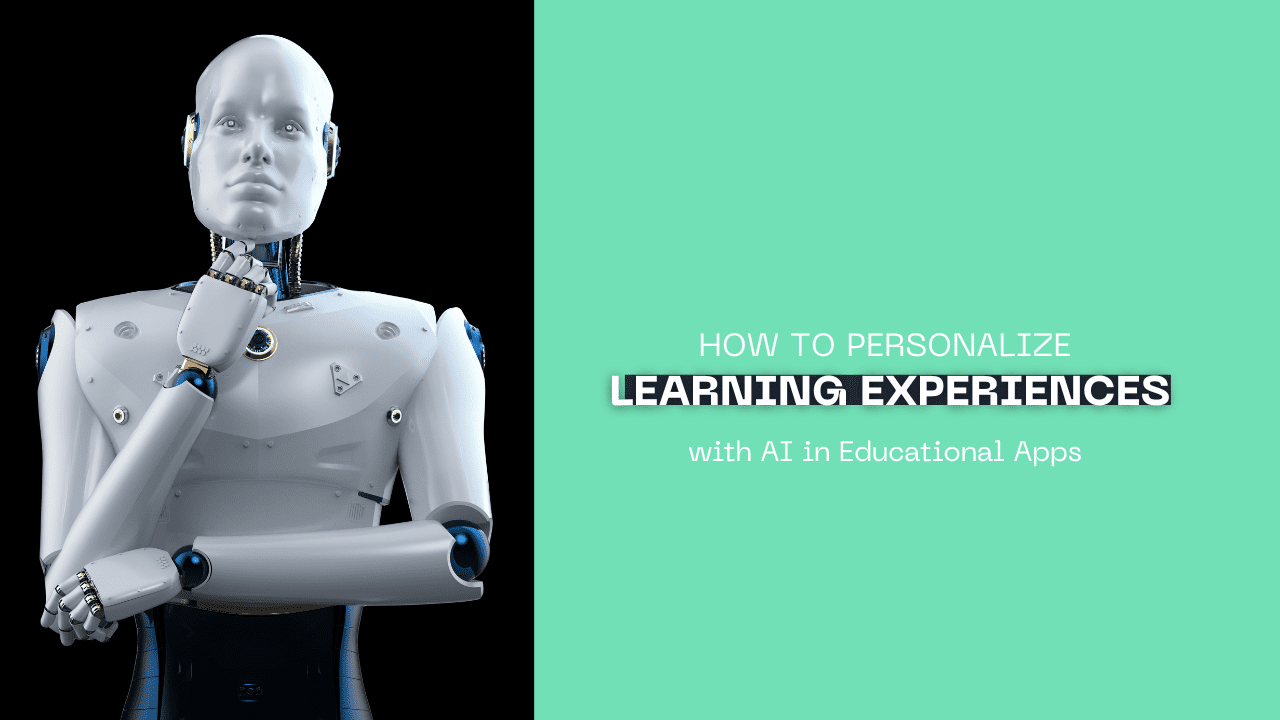Table of Contents
In today’s digital age, Artificial Intelligence (AI) is playing a key role in transforming industries and driving revenue growth. AI’s integration into retail and eCommerce is particularly noteworthy, as businesses harness its capabilities to optimize operations, enhance customer experiences, and boost sales. The impact of AI on retail is evident in the remarkable growth of global eCommerce sales, which are projected to reach $6.33 trillion in 2024, marking an 8.8% annual increase. This growth is driven by AI’s ability to analyze vast amounts of data, enabling retailers to predict consumer behavior, tailor offerings, and streamline supply chains.
Moreover, retail app development is another area where AI plays a crucial role. Integrated AI solutions within apps offer personalized shopping experiences, automate customer service through chatbots, and enhance mobile commerce capabilities. These advancements not only improve customer satisfaction but also contribute to higher conversion rates and revenue growth. In this blog, we have found the answers to your question, “How to boost retail sales with AI?” along with the current use cases. You can also go through this blog if you are a business owner and looking for a scalable retail app development company to get the best solution for your sales.
Ways to Boost Retail Sales with AI Along with the Use Cases
AI applications are revolutionizing the retail industry by providing innovative solutions that enhance customer experiences, optimize operations, and ultimately boost sales. From personalized recommendations and dynamic pricing to AI-driven logistics and sentiment analysis, these ways along with the use cases demonstrate how retailers can leverage AI to meet customer needs and thrive in a competitive market. By adopting these technologies, retailers can set themselves up for long-term success and achieve sustained revenue growth.
Personalized Shopping Experience
Recommendation Engines:
AI-driven recommendation engines analyze customer behavior and preferences to suggest products tailored to individual shoppers. Platforms such as Amazon and Netflix leverage AI algorithms to assess users’ past purchases and viewing behaviors, offering personalized recommendations that enhance engagement and boost conversion rates. This not only enhances the shopping experience but also drives additional sales by encouraging customers to explore related products.
Dynamic Pricing:
Retailers like Walmart and Target, which are the biggest stores in the world, use AI to implement dynamic pricing strategies. AI algorithms analyze real-time data, including competitor prices, demand fluctuations, and customer behavior, to adjust prices automatically. This enables retailers to stay competitive and optimize their profit margins. For example, during peak shopping seasons, prices can be lowered to attract more customers, while prices can be increased during periods of high demand.
Inventory Management
Predictive Analytics for Demand Forecasting:
AI plays a crucial role in helping retailers forecast demand accurately. Companies like Zara and H&M use AI algorithms to analyze historical sales data, market trends, and social media sentiment to predict which products will be in demand. This enables them to optimize inventory levels, reduce stockouts, and minimize excess inventory, ultimately enhancing operational efficiency and customer satisfaction.
Automated Inventory Tracking:
Retailers such as Tesco employ AI-powered inventory management systems that utilize RFID technology and IoT devices to track stock levels in real-time. This automation reduces manual errors and allows retailers to maintain optimal inventory levels. When stock is running low, the system automatically triggers replenishment orders, ensuring that products are always available for customers.
Customer Service Enhancement
Chatbots for Customer Support:
Many retailers, including Sephora and Lowe’s, have integrated AI-powered chatbots into their websites and mobile apps to provide instant customer support. These chatbots can answer frequently asked questions, assist with product searches, and guide customers through the purchasing process. By providing 24/7 support, retailers can enhance the customer experience and free up human agents to handle more complex inquiries. This feature is highly recommended if you are looking for advanced retail app development services for your business.
Sentiment Analysis for Feedback:
AI can analyze customer reviews and feedback across various platforms to gauge sentiment toward products and services. For example, many people like to fulfill their caffeine addiction in the morning and make their first stop at Starbucks. It utilizes AI-driven sentiment analysis tools to monitor social media and customer feedback, enabling them to quickly address customer concerns and improve product offerings. This proactive approach helps retailers adapt to customer preferences and foster loyalty.
Marketing Optimization
Targeted Advertising:
Retailers like Facebook and Google leverage AI to analyze user data and create targeted advertising campaigns. By identifying user interests and behaviors, these platforms enable retailers to reach potential customers with personalized ads. For instance, if a user frequently searches for running shoes, they may see ads for specific brands and promotions tailored to their interests.
Predictive Customer Analytics:
AI can analyze past purchase behavior to predict future buying patterns. Retailers like Walmart, the largest store widely, use predictive analytics to identify high-value customers and target them with personalized marketing campaigns. This approach enhances customer engagement and increases the likelihood of repeat purchases.
In-Store Experience Enhancement
Smart Mirrors and AR Integration:
Some retailers, such as Nordstrom and Sephora, have introduced smart mirrors and augmented reality (AR) applications that allow customers to virtually try on products. This innovative use of AI enhances the in-store experience, enabling customers to visualize how products will look without physically trying them on. By providing a more interactive shopping experience, retailers can reduce return rates and increase customer satisfaction.
Facial Recognition for Personalized Service:
AI-driven facial recognition technology is being adopted by retailers like Lowe’s to identify loyal customers as they enter the store. This technology allows sales associates to provide personalized service based on the customer’s previous interactions and preferences. For instance, if a loyal customer frequently purchases gardening supplies, the associate can offer tailored recommendations upon their arrival.
Supply Chain Optimization
Route Optimization for Delivery:
Retailers such as Amazon utilize AI algorithms to optimize delivery routes for their logistics operations. By analyzing traffic patterns, weather conditions, and customer locations, AI can determine the most efficient routes for delivery vehicles. This not only reduces delivery times but also lowers transportation costs, enhancing overall supply chain efficiency.
AI for Supplier Management:
AI can streamline supplier management by analyzing supplier performance, delivery times, and quality metrics. Companies like Coca-Cola use AI-driven analytics to assess supplier reliability and make informed decisions about procurement. This data-driven approach helps retailers build stronger supplier relationships and ensure a consistent flow of high-quality products.
Benefits of AI to Enhance Retail Sales
AI is a revolutionary change in technology in 2024 and is helping lots of startups and small businesses to outgrow their revenue. Here are some benefits of AI in improving retail sales which you can look into for an exceptional e-commerce app development experience.
- Customized Shopping Experience:
AI tailors product recommendations and marketing messages to each customer’s preferences and behavior. This personalization makes customers feel understood and valued, increasing their likelihood of making a purchase and returning for future shopping.
- Real-Time Price Optimization:
AI dynamically adjusts prices based on factors like demand, competition, and customer behavior. This ensures retailers remain competitive while maximizing profits, driving more sales, and capturing market opportunities as they arise.
- Streamlined Inventory Management:
AI predicts demand with high accuracy, helping retailers maintain optimal stock levels. This reduces the chances of running out of popular items or holding excess inventory, ensuring that customers find what they want and boosting overall sales.
- Smart Customer Engagement:
AI-powered chatbots and virtual assistants offer instant support, answering customer queries and guiding them through the shopping process. This immediate assistance enhances customer satisfaction and increases the likelihood of conversion.
- Precision Marketing Campaigns:
AI enables highly targeted marketing by analyzing customer segments and preferences. Retailers can create personalized campaigns that resonate with specific audiences, leading to higher engagement rates and more effective sales efforts.
Summing Up
As we navigate through the digital era, it is clear that AI is revolutionizing the retail landscape, offering unprecedented opportunities for growth and innovation. From personalized shopping experiences to real-time price optimization, AI empowers retailers to meet and exceed customer expectations, driving sales and boosting profitability. Moreover, the role of AI in retail app development cannot be understated. Integrated AI solutions in mobile apps are transforming how customers interact with brands, making shopping more intuitive, personalized, and efficient.
If you are looking to leverage AI to enhance your retail operations, choosing the right retail app development partner is crucial. At AlgoRepublic, we specialize in Android and iOS app development, integrating cutting-edge Gen-AI solutions tailored to your business needs. Let us help you stay ahead of the curve and boost your retail sales with innovative AI-driven apps. Contact us today to explore how we can elevate your retail experience.
FAQs:
AI uses data from customer interactions, such as past purchases and browsing behavior, to create personalized shopping experiences. This can include tailored product recommendations, customized marketing messages, and targeted promotions, all of which increase the likelihood of purchase and enhance customer satisfaction.
AI-driven pricing tools analyze market trends, customer demand, and competitor pricing in real-time. This allows retailers to adjust prices dynamically, ensuring competitiveness while maximizing profits. The ability to fine-tune pricing strategies in response to market conditions helps drive sales and improve margins.
AI helps retailers maintain optimal inventory levels by predicting demand with high accuracy. It analyzes factors like seasonal trends, sales data, and customer behavior to forecast which products will be in demand. This reduces stockouts and overstock situations, ensuring customers can find what they want, when they want it.
AI-powered chatbots provide instant customer service, answering queries, recommending products, and assisting with purchases around the clock. They enhance the customer experience by offering immediate support, which can lead to increased conversions and customer loyalty.
AI enables retailers to create highly targeted marketing campaigns by analyzing customer data to identify segments and preferences. This allows for personalized and timely marketing efforts that resonate with specific audiences, leading to higher engagement rates and more effective sales strategies.

